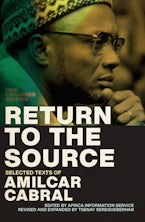Tsenay Serequeberhan is a Professor of Philosophy at Morgan State University in Baltimore. He is the author of the groundbreaking work The Hermeneutics of African Philosophy: Horizon and Discourse and the key text, African Philosophy: The Essential Readings, among other books.
Amilcar Cabral (1924-1973) was a Pan-African freedom fighter and anti-imperialist theorist, best known for bringing the Portuguese empire to its knees. He was born in the Guinea Bissau town of Bafatá, to Cape Verdean parents of divergent classes, living under Portuguese colonial dominion. During a restive period in the development of African nationalist movements, he studied agronomy in Portugal alongside other African colonial subjects who joined together to form student movements dedicated to opposing the ruling dictatorship of Portugal and promoting the cause of independence for all Portuguese colonies in Africa. Upon his return to Africa in the 1950s, he managed, in under a decade, to steer Guinea Bissau towards near total independence. On January 20, 1973, Portuguese agents assassinated Cabral, but his murder did not deter his people from unilaterally declaring independence just eight months later. In life and death, he became an inspiration to revolutionary socialists and national independence movements worldwide.
Tsenay Serequeberhan is a Professor of Philosophy at Morgan State University in Baltimore. He is the author of the groundbreaking work The Hermeneutics of African Philosophy: Horizon and Discourse and the key text, African Philosophy: The Essential Readings, among other books.

